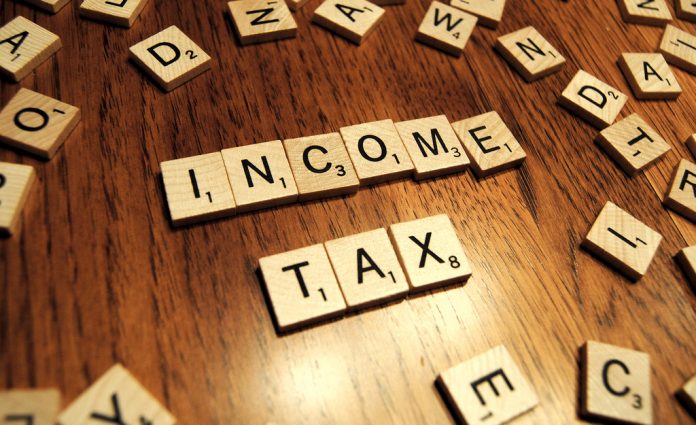This article is written by Monesh Mehndiratta, a law student at Graphic Era Hill University, Dehradun. This article explains the provision of late fees imposed under Section 234F of the Income Tax Act. It further provides the meaning of an income tax return and the time limit for filing it, along with other provisions of penalties or late fees under the Act.
This article has been published by Sneha Mahawar.
Table of Contents
Introduction
Have you filed your income tax return? If not, hurry up, or you will miss the last date to do it. Do you know that if you do not file your income tax return on time, late fees can be imposed upon you?
If you are not aware of this, you need not worry because this article will help you understand all such provisions. If you pay income tax, then you must be aware that it has to be paid and the return has to be filed within the prescribed time limit. In case you forget to do so or miss the due date late fees are automatically imposed upon you. You can still file the return, but with late fees. It is important to note that there is a difference between paying income tax and filing a return. If you have paid the income tax but have not filed the return, you are also subjected to penalties or late fees. Before the insertion of Section 234F in the Income Tax Act, 1961, Section 271A levied a penalty for failure to file a return.
The article explains the provisions of Section 234F and provides the meaning and benefits of filing an income tax return. It also explains the procedure for payment of late fees and mentions the necessary documents required for this. It further provides a tax calendar for the financial year 2021–22 and assessment year 2022–23, along with other provisions of penalty or late fees are given under the Act.
Meaning and scope of Section 234f
If a person fails to file the income tax return within the prescribed time limit, late fees will be imposed according to Section 234F of the Act. For example, if X files his income tax return for AY 2021–22 on 15/08/21, no late fees will be imposed as the return has been filed within the due date. However, if he files the same after the due date, then it will attract late fees. This Section was introduced in 2018 and came into effect from 1st April 2018, as a result of which there has been an amendment to Section 143 as well. The amount of fees payable under Section 234F will be considered when computing the amount of the refund that is due for processing the return.
The section is mandatory in nature, which means that if a person misses the due date for filing the return, late fees will be automatically imposed and there will be no exemption. This section is applicable to all persons, as mentioned under Clause 31 of Section 2 of the Act. The due date for filing an income tax return as prescribed under Section 139 of the Act by an individual, company or firm whose accounts have to be audited is 31st October of the assessment year while in cases where a report under Section 92E has to be furnished, it is 30th November of the assessment year. Thus, all persons, i.e., individuals, HUFs, associations of people, bodies of individuals, companies, firms, etc., are liable to pay late fees in case they miss the due date for filing the return.
Income tax return
A statement of a person’s gross annual income, assets and liabilities, paid taxes and refund which is to be paid by the government is known as an income tax return. It helps a person to disclose his income. If the income of a person exceeds the exemption limit without the deduction given under the Act, he is required to file the return. The filing of a tax return is important, though it may vary due to age, residence, income, etc. Section 139 of the Act provides provisions for the filing of an income tax return even if it has been delayed.
Persons eligible to file an income tax return
Section 139 gives instances where the filing of an income tax return is voluntary or mandatory. The following persons are required to file income tax returns mandatorily:
- If the total income of a person exceeds the exemption limit, he/she is required to file the return within the prescribed time limit.
- Any company or person carrying business in India whether it is private or public irrespective of the fact that it suffered profit or loss.
- Any limited or unlimited liability partnership.
- Residents having assets outside the country or retaining authority over an account that is based outside India are also required to file the return.
- Hindu undivided families or bodies of individuals have to file the return only if the income exceeds exemption limits.
However, filing of return of income tax may be voluntary in certain situations. The section further gives power to the Central Government to exempt any person from filing a return, which can only be done if a notice is issued and placed in each house of parliament.
Subsection 3 of Section 139 states that if an assessee is an individual person and he suffered a loss in any previous financial year, he is exempt from filing the return, but companies and firms have to mandatorily file the return. However, the section lays down certain rules for this purpose:
- If the firm decides to carry forward the loss, the return has to be filed mandatorily before the lapse of the due date.
- If there’s a loss under the head or property it can be carried forward even if the return is filed after the due date.
- A loss can be offset against any category of income for the same year, even if the return has been filed after the lapse of the due date.
- Previous year losses can be carried forward only if the return of such losses was filed before the due date.
Subsection 5 of this section allows the revision of returns in case of a mistake. However, belated returns or returns filed after the due date cannot be revised. This revision of the return can be done either in the original return or in a separate revised return that is filed for this purpose.
Instances where the filing of income tax returns is mandatory
All the persons mentioned above have to mandatorily file the income tax return in the following circumstances:
- The total income of a person is beyond the exemption limit as set under the Act. This exemption limit varies from person to person. However, if a person decides to opt for a new tax regime, he/she cannot avail of the benefits of the exemption limit under the old tax regime.
- For individuals of less than 60 years of age, the exemption limit is 2.5 lakhs rupees.
- For senior citizens i.e. people above 60 years of age, it is 3 lakhs rupees.
- For people above 80 years of age, the exemption limit is 5 lakhs rupees.
- If the assets of a person are located outside India then he/she must mandatorily file an income tax return.
- The amount deposited in the bank account exceeds one crore rupees and fifty lakhs rupees in the case of a savings account.
- In case the travelling expenditure is more than two lakhs rupees to a foreign country, a person has to file the return.
- If gross receipts from a profession and business exceed ten lakhs rupees and sixty lakhs rupees respectively.
- The total amount of tax deducted at source (TDS) or collected at source (TCS) is more than twenty-five thousand rupees.
Defective returns
Subsection 9 of Section 139 of the Act deals with defective returns. It provides that where there is any defect in the income tax return, the tax officer has to inform the assessee and give him a time period of 15 days to rectify the mistake. In order to avoid defects in return, the following documents must be attached properly with it:
- Income tax return along with the required form.
- A statement providing computation of taxes payable.
- Claims of paid taxes and proofs of tax deduction, advance tax, payment of self-assessment tax, etc.
- Audit report.
- Copies of books of accounts, if any, like a balance sheet, a profit and loss statement, personal accounts of members in the case of an association of person and body of individuals, etc.
- Report of cost audit.
- Any other document that is necessary to be furnished.
Advantages of filing an income tax return
Every person whose income exceeds the exemption limit is required to pay tax, and after payment of tax, the return has to be filed. The following are the advantages of filing an income tax return:
- The filing of an income tax return can help avoid penalties under the Act that can be imposed if you fail to do so.
- It helps in availing the benefits of loans as it is one of the requirements for necessary documents that are to be furnished while applying for a loan.
- The return serves as proof of your income, which also depicts that you are a responsible person and hence trustworthy.
- It also helps in claiming adjustments, and deductions, or set off against the losses suffered in the previous year.
- The return is also used as identity proof for a person and is considered a legal document.
- It also helps in quick visa approval as most embassies ask for an income tax return while scrutinising the visa application.
Late fees levied under Section 234F
Section 234F of the Act imposes late fees if a person fails to file an income tax return within the said due date. However, the amount of fees varies due to variations in income and also depends upon the time when the return has been filed. This can be easily understood as:
| Income | Late fees as per Section 234F |
| More than five lakhs rupees and the return has been filed before 31st December of the assessment year. | Rs. 5000 |
| Less than or equal to five lakhs rupees irrespective of the fact whether the return is filed before or after 31st December of the assessment year. | Rs. 1000 |
| Other cases (for example, income is more than five lakhs rupees but the return has been filed after 31st December of the assessment year.) | Rs. 10000 |
Let us take an example to understand this. There are three friends, B, C, and D, and all of them are earning and hence eligible to pay tax. However, they all went on a trip and forgot to file their income tax returns by the due date. They decide to file their return but the due date has lapsed and thus, a penalty has been imposed upon which differs due to variation in their incomes. The quantum of fees is as follows:
| Assessee | Income | Late fees |
| B | Rs. 3,00,000 | Rs. 1000 (income is less than five lakh rupees) |
| C | Rs. 7,00,000, but the return has been filed before the 31st of December of the assessment year. | Rs. 5000 |
| D | Rs. 7,50,000, but the return is filed after the 31st of December of the assessment year. | Rs. 10000 |
Payment of late fees under Section 234F
In order to pay the late fees imposed under the section, one needs to fill out Challan No. 280. Tick on “Self Assessment (300)” in the type of payment column and fill in the amount according to Section 234F in “others.” Below is a sample of Challan 280:
Provisions of interest to be paid in default
The Act provides various penalties in default of certain actions like payment of tax, concealment of income, failure to furnish required documents, failure to furnish an income tax return, etc. Section 234A of the Act provides the interest that is imposed upon an assessee if he/she fails to furnish an income tax return. If this happens, a person is liable to pay simple interest at the rate of 1% for every month or part of a month commencing immediately after the due date. Further, Section 234B provides that if a person fails to pay advance tax according to Section 208 or where the paid tax is less than 90% of the assessed tax according to Section 210, then he or /she is liable to pay interest at the rate of 1%.
Section 243C gives interest that is to be paid for the deferment of advance tax, while interest on excess refunds is given under Section 234D. It provides that the assessee will be liable to pay simple interest at the rate of 0.5% on the excess amount that is refunded for every month or part thereof from the date of refund if:
- No refund is due for the regular assessment.
- The amount refunded exceeds the refundable amount on the assessment.
Conclusion
Taxes play a major role in building the economy of any nation. It also puts an obligation on the government to work for the welfare of its citizens and use the money received through taxation for the development of infrastructure like bridges, roads, educational institutions, hospitals, etc., and technology in the country. Taxes can only be imposed by the government, and no other authority can compel a person to pay them, so if a person fails to pay the tax, the government can impose sanctions in the form of penalties. These penalties are given under the Act. One such penalty is provided under Section 234F of the Act, in which late fees are imposed on a person who fails to file the income tax return for a financial year within the prescribed time limit as set by the appropriate authority.
Frequently Asked Questions (FAQs)
Can a person file his income tax return after the due date?
Yes, an income tax return can be filed by a person if the due date has passed, but he/she will also be liable to pay late fees.
Can the late fees imposed under Section 234F be waived off?
The late fees imposed under this section cannot be waived off as it is mandatory in nature. Every person who defaults in filing the return before or on the due date has to pay the fees imposed under the section without any excuse, as there is no exemption.
Do the senior citizens have any exemption under Section 234F?
The section does not provide any exemption to senior citizens or any other person for the payment of late fees.
Difference between Section 234E and 234F of the Act.
Section 234E of the Act imposes late fees if a person fails or delays filing a TDS return, whereas Section 234F provides late fees for a delayed income tax return.
References
- https://tax2win.in/guide/section-234f
- https://blog.tax2win.in/is-it-mandatory-to-file-income-tax-return/
- https://help.myitreturn.com/hc/en-us/articles/360002322332-Section-234F-Fee-Penalty-for-delay-in-filing-Income-tax-return
- https://taxguru.in/income-tax/section-234f-late-fees-rs-5000-processing-revised-return.html
- https://taxguru.in/income-tax/section-234f-late-fees-payable-default-furnishing-income-tax-return.html
- https://cleartax.in/s/due-date-tax-filing
- https://cleartax.in/s/income-tax-return-filing-benefits
Students of Lawsikho courses regularly produce writing assignments and work on practical exercises as a part of their coursework and develop themselves in real-life practical skills.
LawSikho has created a telegram group for exchanging legal knowledge, referrals, and various opportunities. You can click on this link and join:
Follow us on Instagram and subscribe to our YouTube channel for more amazing legal content.
 Serato DJ Crack 2025Serato DJ PRO Crack
Serato DJ Crack 2025Serato DJ PRO Crack












 Allow notifications
Allow notifications


